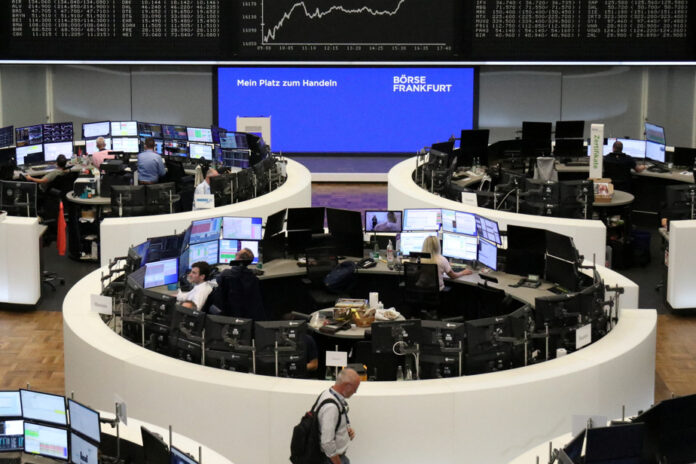(Paris) Global markets fluctuate measuredly on Friday, in a session driven by only a few corporate results, pending central bank announcements next week.
Stock market Europe was not very lively with variations measured in Paris (0.15%), London (0.15%) and Milan (0.06%) around 7:45 a.m., while Frankfurt fell by 0.58%, weighed down by the results of SAP.
The Wall Street indices are also heading for a flat session, with increases of 0.21% and 0.42% respectively for the S
On Thursday, the NASDAQ fell 2% after disappointing results from Netflix, Tesla and TSMC. On the other hand, the Dow Jones had recorded its ninth session of rise in a row, a first since September 2017, taking advantage of an attraction for values abandoned since the beginning of the year, some of which are said to be defensive, that is to say less sensitive to the economic situation.
Christian Parisot, of broker Aurel BGC, observes “a day off. Investors will already be looking ahead to next week, which will be marked by the meeting of the monetary policy committees of the major central banks” and by new corporate results.
In Asia, the Tokyo market lost 0.57%, weighed down like the day before by the values of the semiconductor sector.
Inflation in Japan accelerated in June, to 3.3% year on year excluding fresh produce, as expected by economists.
The yen fell in reaction, the market considering that inflation has probably peaked and that the Bank of Japan should not deviate from its ultra-accommodative policy.
The Japanese currency fell 1.18% against the dollar at 141.75 yen per dollar and lost 1.19% against the euro at 157.77 yen per euro around 7:45 a.m. (Eastern time).
As for the Chinese stock markets in Shanghai (-0.06%) and Shenzhen (-0.05%), they fell slightly after China unveiled several measures on Friday to revive growth, in particular by supporting the automotive sector and encouraging the purchase of electronic products. The Hong Kong market, for its part, resisted (0.78%).
The Swiss group Lonza, a supplier for the pharmaceutical industry, fell by 10.92% in Zurich after the publication of sales slightly below expectations in the first half, held back by the difficulties of financing of biotech companies, which led it to cut in its margin targets.
Sartorius Stedim Biotech (SSB), a materials supplier to the biopharmaceutical industry, reported lower business and profitability in the first half due to “temporarily weak demand”. However, demand is expected to “gradually pick up again in the second half of 2023”, according to René Fáber, group managing director.
Its share gained 1.52% in Paris and that of its parent company, listed in Frankfurt, yielded 0.89%. These results were expected after the announcement in June of lowered sales forecasts for 2023, which had caused their prices to fall.
Software giant SAP fell 4.02% after slashing its forecast for the year for cloud revenue. Its operating profit, however, jumped nearly 30% in the second quarter (in international IFRS standards), it announced Thursday evening.
Oil was advancing around 7:45 a.m. EST, pushed by production cuts by the two heavyweights of the Organization of the Petroleum Exporting Countries and their Allies (OPEC).
A barrel of Brent from the North Sea for September delivery took 1.13% to 80.54 dollars.
Its American equivalent, the barrel of West Texas Intermediate (WTI), for delivery on the same date, of which it is the first day of use as a reference contract, gained 1.31% to 76.64 dollars.
The day after a lower-than-expected increase in the Turkish central bank’s key rate, the Turkish lira still suffered (-0.65%) against the dollar, at 26.94 pounds to the dollar.
The euro was stable at $1.1130.
Bitcoin was up 0.11% at $29,770.
On the bond market, sovereign rates were stable after rising the day before.















